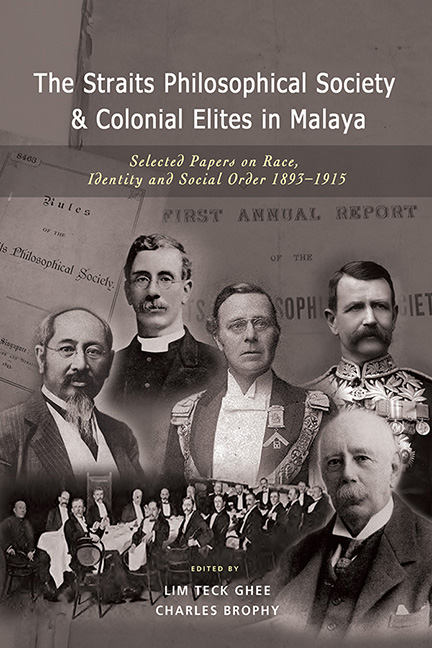 The Straits Philosophical Society and Colonial Elites in Malaya
The Straits Philosophical Society and Colonial Elites in Malaya 24 - Our Duty to the Malays
Published online by Cambridge University Press: 09 January 2024
Summary
Editors’ Note
Administrative discussions around British obligations to protect and uplift the Malays were important themes throughout the essays of the Society. This would contribute towards a discourse and, more importantly, a doctrine of protection which would become enshrined in post-colonial policies of race and immigration as well as in the formation of an independent Malaya. This discourse was evident in C.W.S. Kynnersley’s essay in 1901. Kynnersley was a British colonial administrator who joined the Straits Settlements civil service in 1872 and in 1901 was serving as the acting Colonial Secretary of the Straits Settlements. Kynnersley’s essay, like broader colonial discourses, emphasized the underdevelopment of the Malays, as well as the failure of British policy to protect and uplift them through education and development. This reinforced, for Kynnersley, his concern in a British obligation to modernize and reform the Malays. Highlighting those states where the Malays had remained in the majority, he noted their ability under British guidance to govern themselves and develop their states. For this to be achieved, he argued for British policy to create the conditions for their growth. Central to this was a need to make provision for Malays in the civil service and to limit the employment of immigrant communities. Debates over the issues he raised continued to be significant in the Straits Settlements and Malay States for a long time after Kynnersley’s essay.
Being called on this evening to deliver an Introductory Address, I must in the first place crave the indulgence of members of this Society. I am aware that in past years the Society has enjoyed the privilege of listening to addresses from those who have so worthily filled the office of President. When at our last meeting I expressed the regret which we all felt at the departure of our learned and genial President, who was deeply interested in the work of the Society, I was fully sensible of the honour you were doing to me in asking me to act in his place. It is, I think, wisely provided in our Rules that the papers to be read are not confined to subjects which can properly be called Philosophical.
- Type
- Chapter
- Information
- The Straits Philosophical Society and Colonial Elites in MalayaSelected Papers on Race, Identity and Social Order 1893-1915, pp. 356 - 362Publisher: ISEAS–Yusof Ishak InstitutePrint publication year: 2023
